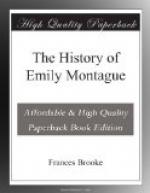That she has the tenderest affection for me, I cannot doubt one moment; her attention is too flattering to be unobserved; but ’tis that kind of affection in which the mind alone is concerned. I never gave her the most distant hint that I loved her: in her situation, it would have been even an outrage to have done so. She knows the narrowness of my circumstances, and how near impossible it is for me to marry; she therefore could not have an idea—no, my dear girl, ’tis not to love, but to true delicacy, that she has sacrificed avarice and ambition; and she is a thousand times the more estimable from this circumstance.
I am interrupted. You shall hear from me in a few days.
Adieu!
Your
affectionate
Ed.
Rivers.
LETTER 65.
To Miss Rivers, Clarges Street.
Silleri, Feb. 10.
I have mentioned my plan to Emily, who is charmed with it; ’tis a pretty evening amusement for two solitary girls in the country.
Behold the first fruits of our correspondence:
“To Miss Fermor.
“It is not to you, my dear girl, I need vindicate my conduct in regard to Sir George; you have from the first approved it; you have even advised it. If I have been to blame, ’tis in having too long delayed an explanation on a point of such importance to us both. I have been long on the borders of a precipice, without courage to retire from so dangerous a situation: overborn by my family, I have been near marrying a man for whom I have not the least tenderness, and whose conversation is even now tedious to me.
“My dear friend, we were not formed for each other: our minds have not the least resemblance. Have you not observed that, when I have timidly hazarded my ideas on the delicacy necessary to keep love alive in marriage, and the difficulty of preserving the heart of the object beloved in so intimate an union, he has indolently assented, with a coldness not to be described, to sentiments which it is plain from his manner he did not understand; whilst another, not interested in the conversation, has, by his countenance, by the fire of his eyes, by looks more eloquent than all language, shewed his soul was of intelligence with mine!
“A strong sense of the force of engagements entered into with my consent, though not the effect of my free, unbiassed choice, and the fear of making Sir George, by whom I supposed myself beloved, unhappy, have thus long prevented my resolving to break with him for ever; and though I could not bring myself to marry him, I found myself at the same time incapable of assuming sufficient resolution to tell him so, ’till his mother’s letter gave me so happy an occasion.
“There is no saying what transport I feel in being freed from the insupportable yoke of this engagement, which has long sat heavy on my heart, and suspended the natural chearfulness of my temper.




